Health Consumers Are Now Amazon-Primed for Healthcare – HealthConsuming Explains, Part 2
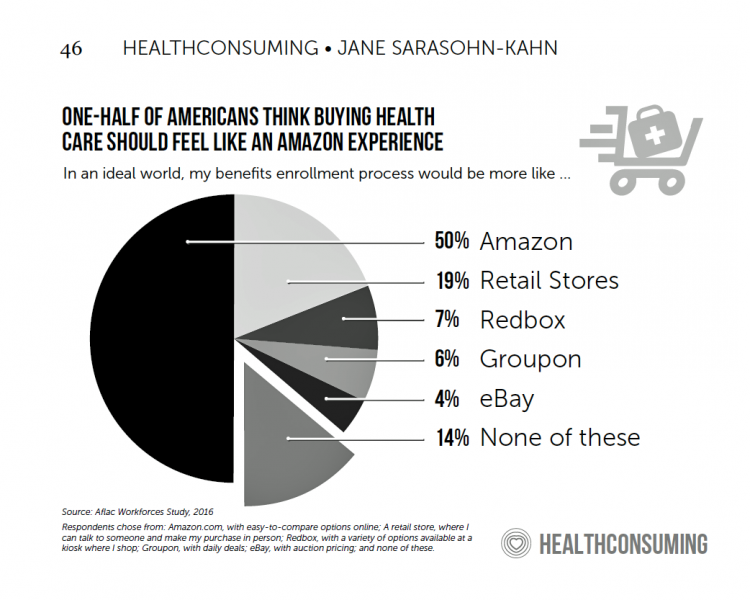
As patients now assume the role of health consumer, they rationally expect retail-level experiences with greater first-dollar payment for health insurance, health care services and medical products like prescription drugs. Consumers know what good retail looks and feels like, and are focusing that experiential lens on health care, Aflac found when their Workforces Survey polled Americans on their desirable health insurance shopping experience. One in two people said it should feel, “like Amazon,” and another 20% of folks said, “like retail.” Chapter 3 of HealthConsuming is titled, “How Amazon Has Primed Health Consumers,” and explains this re-shaping of patient expectations.
Isn’t It Eyeconic? Vision Care in the Evolving Health Care Ecosystem
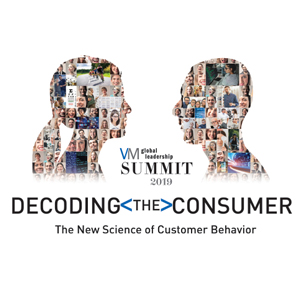
The vision/optical industry is one piece of the health/care ecosystem, but the segment has not been as directly impacted by patients’ new consumer muscles until just about now. It feels like the vision industry is at an inflection point at this moment, I intuited during yesterday’s convening of Decoding the Consumer: The new science of customer behavior, the theme of the 13th annual global leadership summit hosted by Vision Monday, a program of Jobson Medical Information which is part of the WebMD family. I was grateful to have an opportunity to share my views with attendees on the vision patient as
Can AI Make Healthcare Human Again? Dr. Topol Says “Yes”
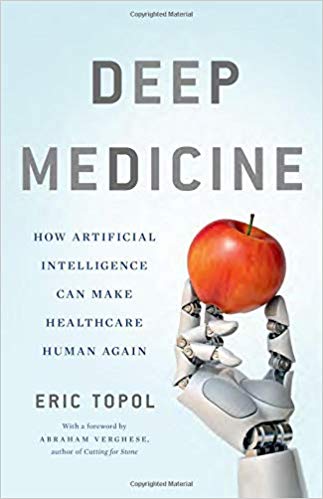
“The Fourth Industrial Age,” Dr. Abraham Verghese writes, “has great potential to help, but also to harm, to exaggerate the profound gap that already exists between those who have much and those who have less each passing year.” Dr. Verghese asserts this in his forward to Deep Medicine, Dr. Eric Topol’s latest work which explores the promise of artificial intelligence (AI), Big Data, and robotics — three legs of the Fourth Industrial Age stool. [If you don’t know the work of Dr. Verghese, and since you’re reading the Health Populi blog, you must get to know Dr. V now. Your
The Balance of Personalization and Privacy For Health/Care – Amazon and Beyond
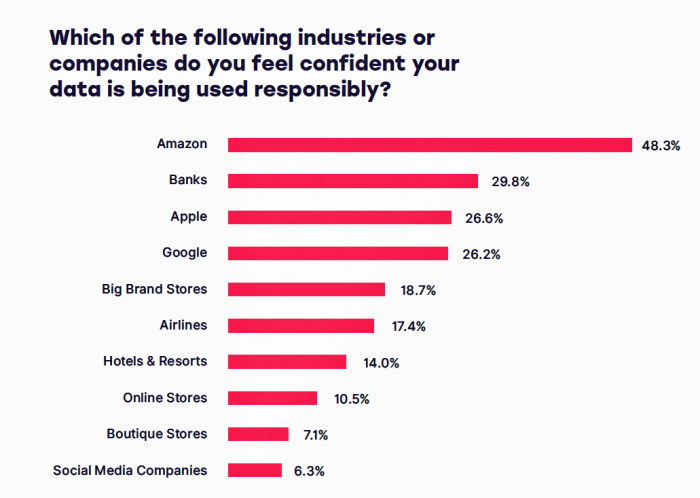
“Is it possible to take personalization too far for consumers?” asks a paper on Privacy and Personalization from SmarterHQ. The answer is, “it depends.” Consumers are sending mixed messages to marketers about their preferences for being forgotten versus being engaged and recognized. This tension has extreme relevance for personal health and healthcare, as AI and data analytics become quickly adopted by payors, insurance companies, providers, pharma, and consumer tech companies that lie outside of HIPAA privacy and security regulations. SmarterHQ polled over 1,000 consumers and found that: Most consumers are concerned about their data privacy, and believe that companies know too
Digital Transformation Is The New Mantra But Can’t Happen Without Access To Connectivity
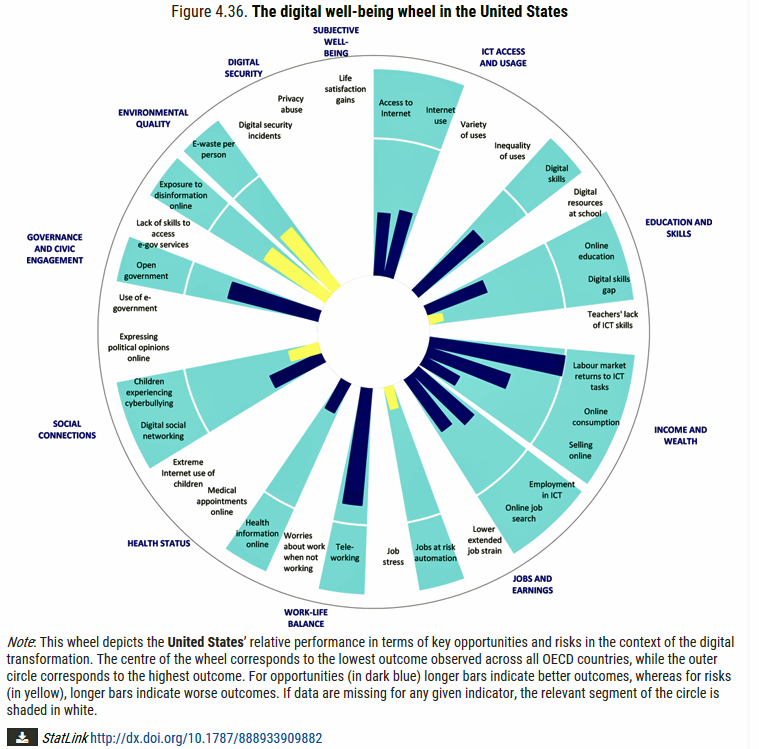
As more of our “things” get digitally connected, there’s an unanswered question about how our connected lives impact human life and health. A new report from the OECD asks and answers: How’s Life in the Digital Age? Opportunities and Risks of the Digital Transformation for People’s Well-being. This research is part of OECD’s ongoing series asking the Big Question, “How’s Life?” A prevailing current mantra in work and daily living is “digital transformation.” The OECD broadly defined the phrase in their 2017 paper on the topic as follows: Mobility, cloud computing, the Internet of things (IoT), artificial intelligence (AI) and big
Deep Human Interactions: The Antidote To More AI In Health Care – Learning From Philips’ CEO At HIMSS19
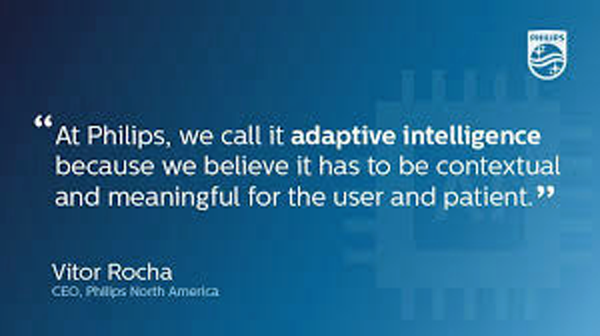
“The promise of AI is undeniable…could AI help clinicians deliver better and more humanistic care?” This question is asked and answered in a JAMA viewpoint published January 1/8 2019 titled, Humanizing Artificial Intelligence. This theme motivated a conversation held over a dinner convened by Philips hosted by Frans Van Houten this week at HIMSS19. To provide context Geoff Colvin, Fortune‘s Senior Editor, first talked about taking friction out of industries, as Lyft and Uber have done in the transport sector. “Taking friction out of industries challenges and changes business models,” Geoff noted. With Uber’s IPO valuation approaching $100 billion, I’d say that’s
Trust in 2019 Via Edelman: The Plotline for Women and Healthcare
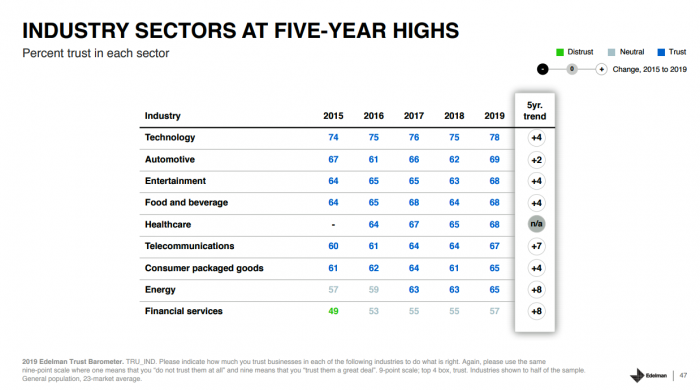
Fewer than one-half of consumers trust in government and media. Three-quarters trust employers, who in 2019 are the top-trusted institution according to the 2019 Edelman Trust Barometer released last week in Davos at the World Economic Forum. Consumers in the U.S. over-index for trust in employers, with 80% of people saying they have a strong relationship with “my employer,” compared with 73% of Britons, 66% of the French, and 59% of people in Japan. What’s underneath this is employers being trusted to provide certainty: most workers look to their employer to be a trustworthy source of information about social issues and
Calling Out Health Equity on Martin Luther King Day 2019
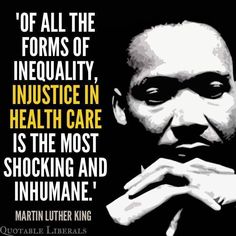
On this weekend as we appreciate the legacy of Martin Luther King, Jr., I post a photo of him in my hometown of Detroit in 1963, giving a preliminary version of the “I Have a Dream” speech he would deliver two months later in Washington, DC. Wisdom from the speech: “But now more than ever before, America is forced to grapple with this problem, for the shape of the world today does not afford us the luxury of an anemic democracy. The price that this nation must pay for the continued oppression and exploitation of the Negro or any other
A Smarter Home for Healthy Living at CES 2019….and a nod to Microsoft
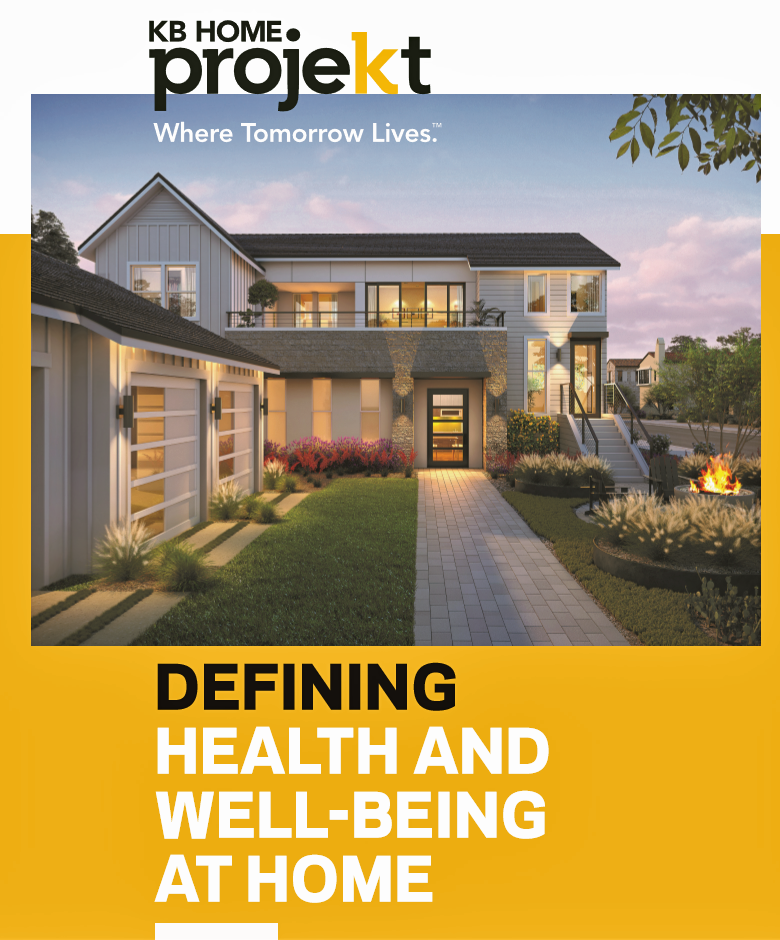
Health begins at home. I found evidence for that, beyond my own N of 1 understanding, in a research article published in the UK in 2000 by Lyn Harrison and Frances Heywood. Lyn and Frances tested three assumptions that they believed linked housing and health: that housing contributes to health; that housing is not routinely included in health or social planning;’ and that the potential contribution of primary care is wasted. Their conclusion: that the housing-health link was not receiving the recognition that connection needs. Nearly two decades later, that housing-health link still isn’t universally embraced by health care stakeholders. But
Shelly Palmer De-Hypes CES 2019 & Has Lessons for Health/Care
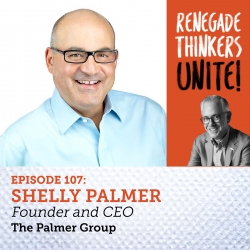
I had the pleasure once again of attending Shelly Palmer’s annual kick-off breakfast where he level-sets our expectations for CES two hours before the tech halls open. Shelly is a consumer tech expert and leads the Palmer Group; comments on Fox 5 in NYC, CNN, and CNBC; writes a weekly column in Advertising Age; composes music; and he’s a Renaissance Man who’s a generous sharer of knowledge with a great sense of humor and humanity. Shelly is one of my trusted touchpoints for all-things-consumer-tech. His message at the start of #CES2019: this year, the show is about connectivity and partnership.
Heart Health at #CES2019 – Food and Tech as Medicine
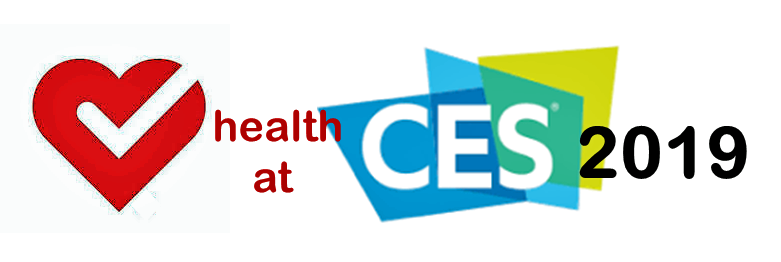
Self-care is the new health care as patients, now consumers at greater financial risk for medical spending, are learning. At #CES2019, I’m on the lookout for digital technologies that can help people adopt and sustain healthy behaviors that can help consumers save money on medical care and enhance quality of life-years. This week’s heart-and-food tech announcements at #CES2019 coincide with an FDA recall on a popular drug prescribed to treat hypertension (high blood pressure). Using food and tech as medicine can help people avoid going on medications like statins and others for heart health. An important example of this self-care
What #CES2019 5 Tech Trends to Watch Mean for Health/Care
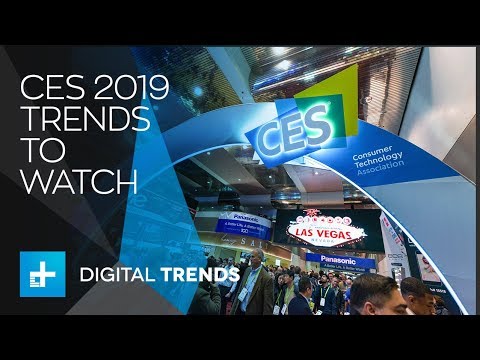
As #CES2019 kicks off in Las Vegas with today’s first Media Day, the Consumer Technology Association presented its forecast on the 5 Technology Trends to Watch in 2019 — and they all play into health, wellness, and medical care. The five trends are: Artificial Intelligence on the Rise Envisioning the Smart Home of the Future Digital Health Tech Empowers Patients Esports and Sports Technology, and Smart Cities Promote Resilience. Here are how these five mega-trends can bolster our health and healthcare products and services over the next decade. AI is indeed on-the-rise in healthcare: as I have begun planning my agenda for
The Venture Valkyrie’s Next AdVenture

Investor, advisor, operator, podcaster, blogger, speaker, Board member, mentor, mother, wife, volunteer. Take inventory of the many hats of Lisa Suennen, aka the Venture Valkyrie, and you understand why I see her as the Renaissance Woman of Healthcare. Ron Popeil couldn’t incorporate this many features into a contraption – yes, she slices and dices healthcare and technology, places bets on the best of them, and she deploys a whole lot more tools in her Mary Poppins-rich toolbox. Two months ago, Lisa announced she was leaving GE Ventures, where she was Senior Managing Director, to do something new. This week, she
How Food and Data Can Support Consumers and Healthy Living: Listening at Groceryshop
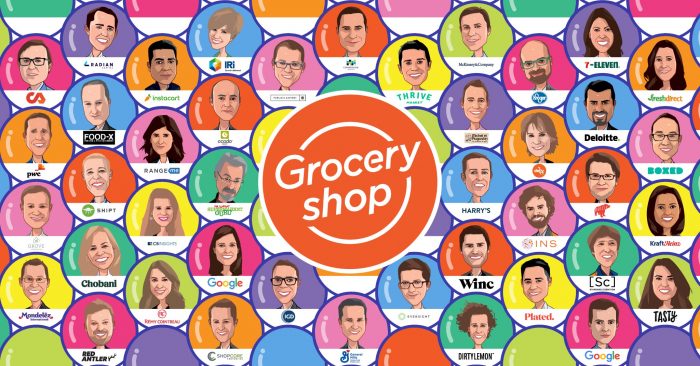
Eat food, not too much, mostly plants, Michael Pollan advised us on the cover of his breakthrough book on nutrition in America, In Defense of Food. In Las Vegas, it’s not too easy to live and eat according to Pollan’s Food Rules. We’re at a fork in the road when it comes to food, retail grocery shopping, and health, which is an intersection I’m increasingly working in these days. The Groceryshop conference is further informing my understanding of the landscape of the technology that’s enabling the consumer’s ability to curate, purchase, and receive the food they want to satisfy hunger and
Loneliness, Public Policy and AI – Lessons From the UK For the US
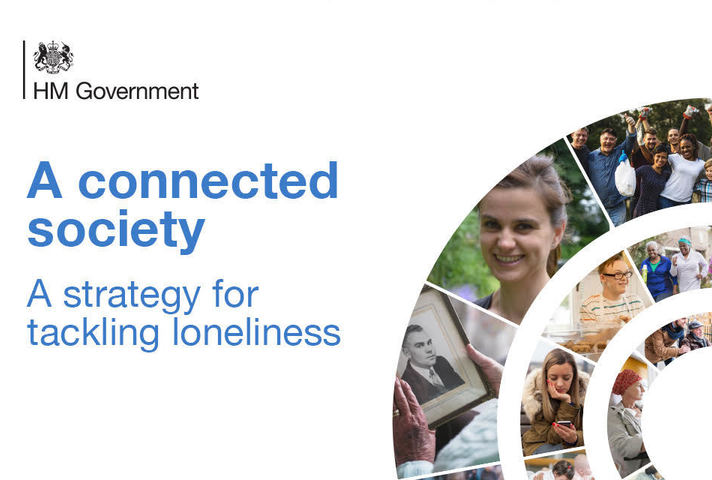
There’s a shortage of medical providers in the United Kingdom, a nation where healthcare is guaranteed to all Britons via the most beloved institution in the nation: The National Health Service. The NHS celebrated its 70th anniversary in July this year. The NHS “supply shortage” is a result of financial cuts to both social care and public health. These have negatively impacted older people and care for people at home in Great Britain. This article in the BMJ published earlier this year called for increasing these investments to ensure further erosion of population and public health outcomes, and to prevent
Open Source Health Care Will Liberate Patients
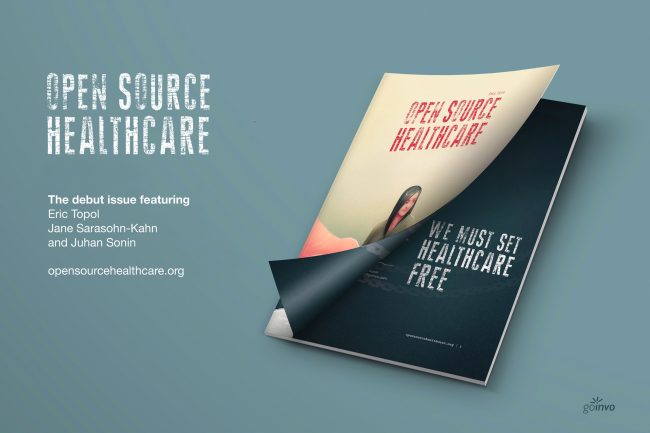
Information is power in the hands of people. When it’s open in the sunshine, it empowers people — whether doctors, patients, researchers, Presidents, teachers, students, Everyday People. Welcome to the era of Open Source Healthcare, not only the “about time” for patients to own their health, but for the launch of a new publication that will support and continue to evolve the concept. It’s really a movement that’s already in process. Let’s go back to some definitions and healthcare basics to understand just why Open Source Healthcare is already a thing. When information access is uneven, it’s considered
Retail Tomorrow, Today: A Smart Grocery Cart and Digital Samples For Paleo-Eating Moms

In our Amazon-Primed world, the future of retail is not ten years from now; it’s “tomorrow.” So GMDC, the association of retailers and brands who supply them, has formed a program called Retail Tomorrow to turbocharge the supply side with consumers who are already demanding convenience, immediate (or “soon”) gratification, and health where she/he “is.” That’s personalization, and that’s where retail health can and is making a difference in Everyday Peoples’ lives. In our DIY culture, we’re pumping our own petrol, making our own airline and hospitality reservations (from Expedia to Airbnb), trading stocks online, and cooking at home enabled by
Disruption Is Healthcare’s New Normal
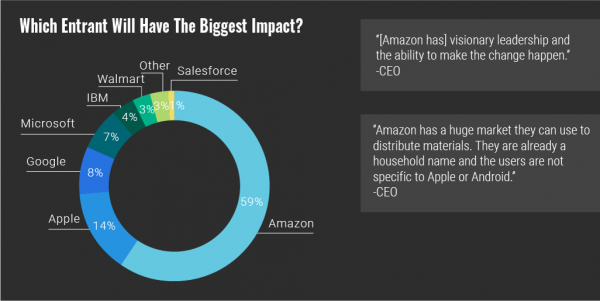
Googling the words “disruption” and “healthcare” today yielded 33.8 million responses, starting with “Riding the Disruption Wave in Healthcare” from Bain in Forbes, Accenture’s essay on “Big Bang Disruption in Healthcare,” and, “A Cry for Encouraging Disruption” in the New England Journal of Medicine Catalyst. This last article responded to the question, “Can we successfully deliver better quality care for patients at a lower cost?” asked by François de Brantes, Executive Director of the Health Care Incentives Improvement Institute. “Disruption” as a noun and an elephant in our room has been with us in healthcare since the September/October 2000 issue of
Employers Take on Health Activism, Embracing Behavioral Health, Virtual Care, AI, and Transparency
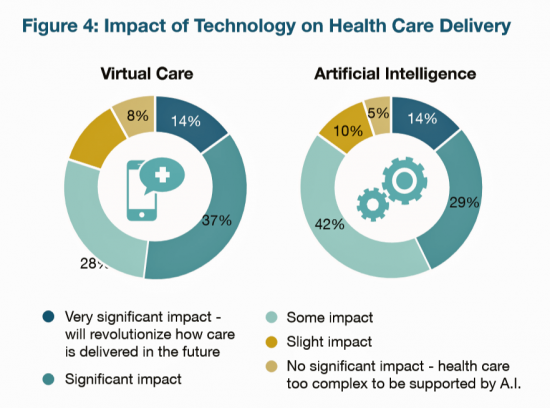
More U.S. employers are growing activist roles as stakeholders in the healthcare system, according to the 2019 Large Employers Health Care Strategy and Plan Design Survey from the National Business Group on Health (NBGH). Consider the Amazon-Berkshire Hathaway-JPMorgan Chase link up between Jeff Bezos, Warren Buffet, and Jamie Dimon, as the symbol of such employer-health activism. The NBGH report is based on survey results collected from 170 large employers representing 13 million workers and 19 million covered lives (families/dependents). This annual survey is one of the most influential such reports released each year, providing a current snapshot of large employers’ views
If Data Is The New Oil in Healthcare, Will It Be Safe to Drink? The Accenture Digital Health Tech Vision 2018
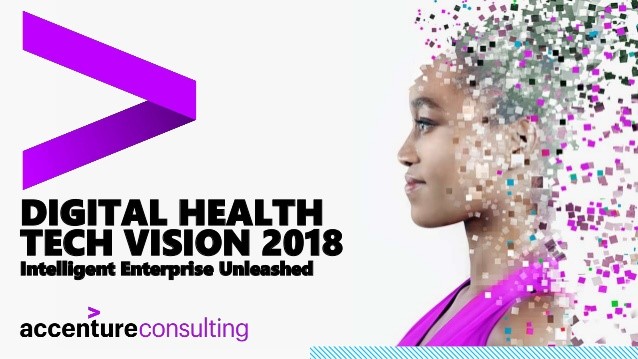
With the vast majority of patients’ medical records now digitized in electronic health records systems, the opportunities to mine, learn from, and act on the findings are promising for U.S. healthcare. More data is moving into internet clouds every day, from healthcare encounters with clinicians and inpatient hospital stays to prescribed medicines, retail receipts for over-the-counter remedies, wearable technologies, credit card swipes for products and services, and GPS check-ins. That’s a treasure trove of digital footprints that can tell a lot about us as patients, either in real-time or via prediction. But can we nudge stakeholders in health and healthcare
In This Eroding Era of Trust, Consumers Look to Doctors Above Banks and Retailers for Trusted Sharing
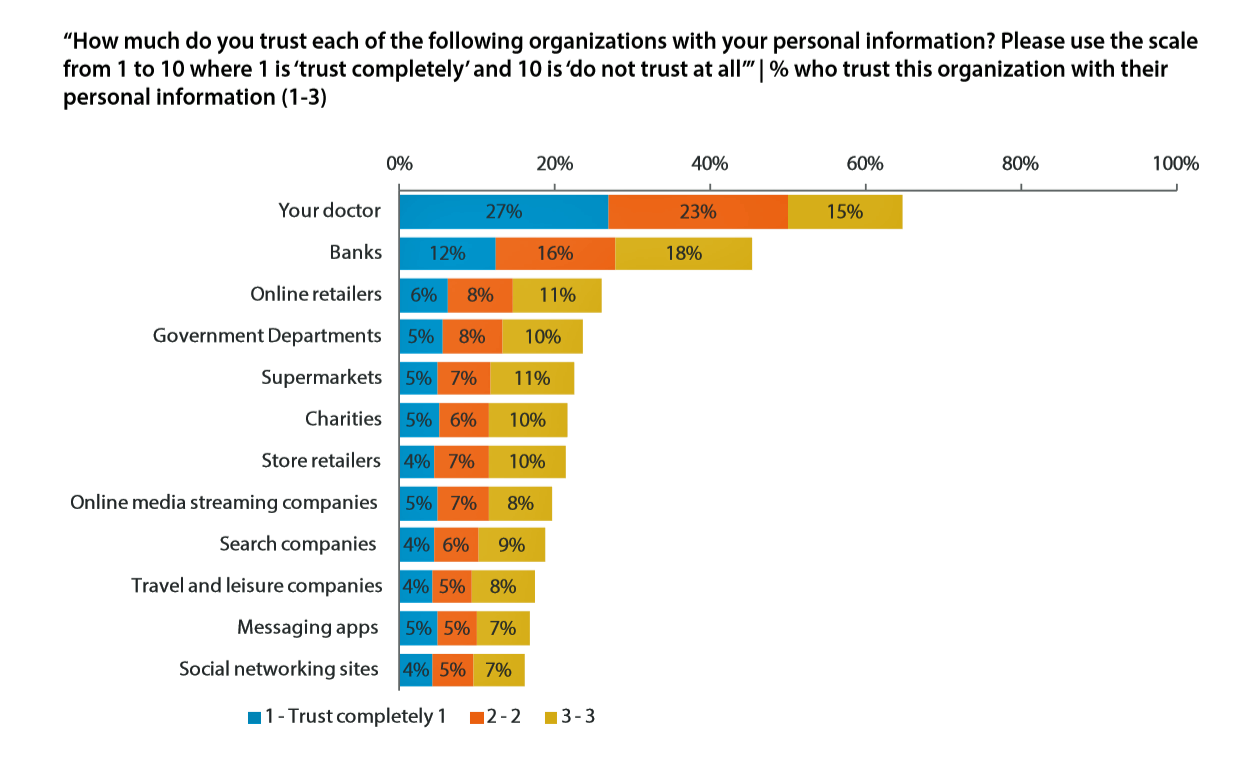
In this moment post-Cambridge Analytica/Facebook, the launch of the GDPR, and the everyday-ness of data breaches, consumers most trust doctors for sharing personal information. I’ve mined, through my health economic lens, the U.S. data published in the insightful report, Data Privacy: What the Consumer Really Thinks, a global research study from Axciom and the Data & Marketing Association (recently acquired by the Association of National Advertisers) working with Foresight Factory. The report compares consumers’ personal views on privacy and trust in ten countries: Argentina, Australia, Canada, France, Germany, the Netherlands, Singapore, Spain, the UK, and the US. We learn that Americans
Design, Empathy and Ethics Come to Healthcare: HXD

Design-thinking has come to health/care, finally, and Amy Cueva has been beating this drum for a very long time. I’m delighted to be in her collegial circle, speaking at the conference about the evolving healthcare consumer who’s financially strapped, stressed-out, and Amazon Primed for customer service. I’m blogging live while attending HXD 2018 in Cambridge, MA, the health/care design conference convened by Mad*Pow, 26th and 27th June 2018. Today was Day 1 and I want to recap my learnings and share with you. Amy, Founder and Chief Experience Office of Mad*Pow, kicked off the conference with context-setting and inspiration. Design
As Medical Cost Trend Remains Flat, Patients Face Growing Health Consumer Financial Stress

When it comes to healthcare costs, lines that decline over time are generally seen as good news. That’s how media outlets will cover the top-line of PwC’s report Medical cost trend: Behind the numbers 2019. However, there are other forces underneath the stable-looking 6.0% medical trend growth projected for 2019 that will impact healthcare providers, insurers, and suppliers to the industry. There’s this macro-health economic story, and then there’s the micro-economics of healthcare for the household. Simply put: the impact of growing financial risk for healthcare costs will be felt by patients/consumers themselves. I’ve curated the four charts from the
Doctors Say EHRs Are Good for Storage, But Risky for Patient Relationships and Burnout

Doctors have a complicated relationship with electronic health records (EHRs): two-thirds of primary care providers (PCPs) see value in digital records (EHRs), but at the same time believe the technology has weakened relationships with patients, detracted from clinical effectiveness, and lack streamlined user experience. That deficiency is, in three words, lack of interoperability; that challenge has required one-half of physician-users to use work-around’s to make their EHR investments more useful. These insights come out of a survey conducted among primary care providers by The Harris Poll for Stanford Medicine, published to coincide with the medical school’s convening of the EHR
How to Make Healthcare More Intelligent and Trustworthy: Accenture’s Digital Health Tech Vision 2018

“Do no harm” has been the professional and ethical mantra of physicians since the Hippocratic Oath was first uttered by medical students. The origins of that three-word objective probably came out of Hippocrates’ Corpus, which included a few additional words: “to do good or to do no harm.” The proliferation and evolution of digital technologies in health care have the potential to do good or harm, depending on their application. Doing good and abstaining from doing harm can engender trust between patients, providers, and other stakeholders in health. Trust has become a key currency in provider/patient/supplier relationships: 94% of health executives
Think Like a LEGO Builder in Healthcare – Considering PwC’s New Health Economy Vision
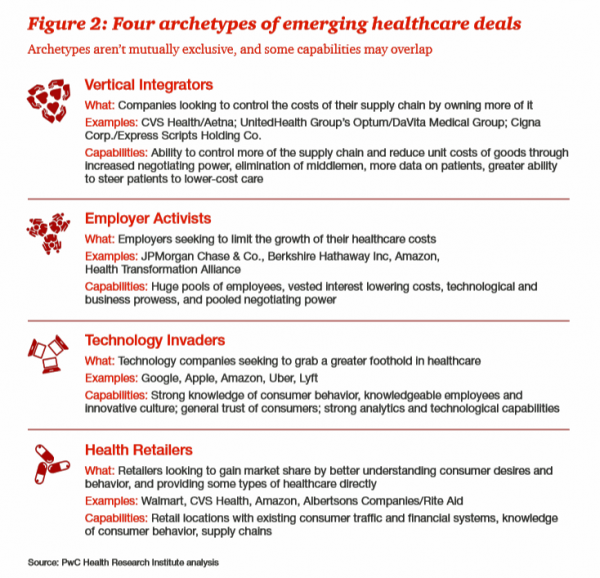
Expect “new combinations” of industry actors and technologies to reorganize and re-imagine healthcare, with an eye on both price and investments in customer experience (CX), PwC envisions in their latest report on The New Health Economy in the Age of Disruption. In this vision, healthcare will be a more flexible marketplace underpinned by data, platforms, and workers. Yes, it’s challenging to get from here-to-there, but PwC explains just how this can happen. Four archetypes, models, of healthcare deals have begun to emerge in the marketplace, illustrated by the Big Deals and announcements reshaping the industry in the past couple of years:
Consumer Trust, Privacy and Healthcare – Considering #HIMSS18 in the Stark Light of Facebook and Cambridge Analytica
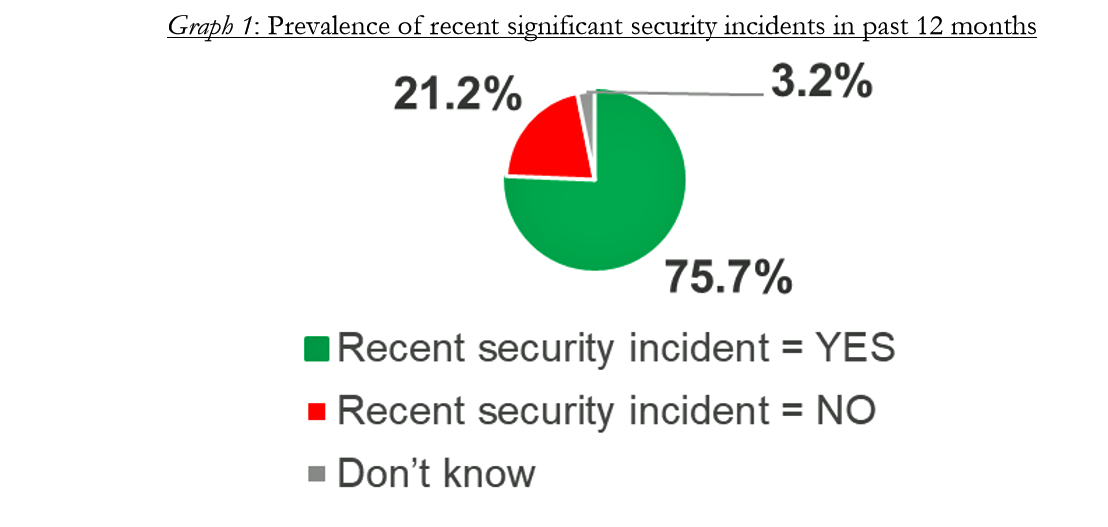
What a difference a couple of weeks make…. On 1st March 2018, two over-arching issues remained with me leaving Las Vegas and #HIMSS18: the central, recognized role of cybersecurity threats in healthcare, and the growing use of consumer-facing technologies for self- and virtual care. Eighteen days later, we all learned about Cambridge Analytica’s misuse of 50 million Americans’ social network data posted on Facebook. We who work in healthcare must pose the questions: going forward, how trusting will patients, consumers and caregivers be sharing their personal health information (PHI)? Will people connect dots between their Facebook lives – and their
How the Latest on Facebook and the “Deep State” Could Undermine Patient Data Sharing and AI
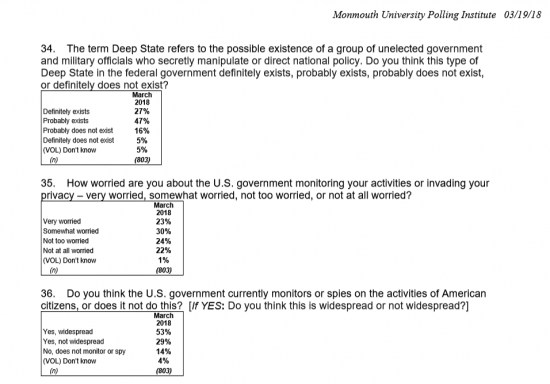
There’s a potential large obstacle that could prevent the full benefits of the current go-go, bullish forecasts for artificial intelligence (AI) to help make healthcare better: a decline in consumers’ willingness to share their personal data. Along with the overall erosion of peoples’ trust in government and other institutions comes this week’s revelations about Facebook, Cambridge Analytica, and the so-called Deep State. Three-fourths of Americans believe that some type of “Deep State” in the federal government exists, a new poll from Monmouth University published yesterday. I clipped the responses to three of the survey’s most relevant questions here. Not only
#Engage4Health: How Patients Are Morphing Into Healthcare Consumers, for #HIMSS18
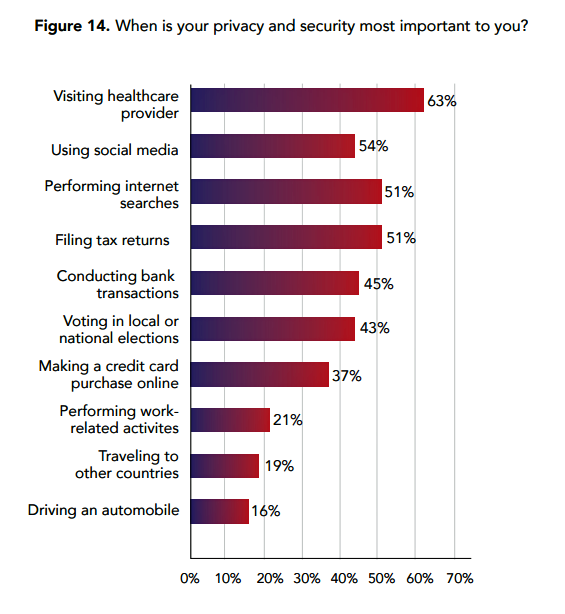
This blog appears today as part of a #HIMSS18 primer series for attendees, and the industry at large, to discuss major health IT issues that will help move health and healthcare delivery forward in 2018 – and beyond. I’m grateful to HIMSS to be one of 20 Social Media Ambassadors appointed for this year’s conference, which convenes in Las Vegas at the Sands Expo Center from March 5 to 9th, 2018. Prioritizing the patient-as-consumer through my health economic lens, the biggest priorities will be: Engaging patients in self-care and driving health and health plan literacy to better manage constrained access
Healthy Living in Digital Times at CES 2018

Connecting Life’s Dots, the organization Living in Digital Times partners with CES to deliver conference content during the show. At CES 2018, LIDT is connecting a lot of dots to help make health streamline into daily living. Robin Raskin, founder, kicked off LIDT’s press conference setting the context for how technology is changing lifestyles. Her Holy Grail is to help make tech fun for everybody, inclusive for everybody, and loved by everybody, she enthused. LIDT has been a presence at CES for many years, conceiving the contest the Last Gadget Standing, hosting tech-fashion shows with robots, and supporting a young innovators
Smarter, Streamlined, Connected Consumers – The Promise of CES 2018

Journalists and industry analysts from around the globe have come to Las Vegas which, this week, is the mecca for new-new electronic things that companies think consumers will be keen to buy. On media day 1, I spoke with a colleague from the Netherlands who covers audio, a sector that’s certainly in disruption; an automotive analyst from India covering autonomous vehicles; and, a mobile tech guru based in Dubai, to identify just a few of my media friends who have gathered here to research and write on their respective beats. In these conversations, there are some common buzzwords floating around
Evidence is Growing for Using Digital Health Apps, Says IQVIA
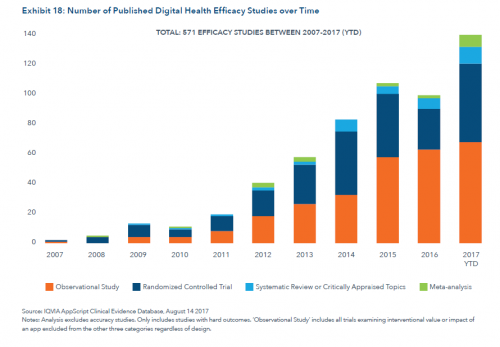
The evidence of the value of digital health tools is growing, based on research published in The Growing Value of Digital Health, from the IQVIA Institute for Human Data Science. With this report, the IMS Institute ushers in the organization’s new name, IQVIA Institute (THINK: “I” for “IMS,” and “Q” for “Quintiles). This is the organization’s third report on digital health, following the original analysis from 2013, updated in 2015. Here’s my take on the 2013 report, which found that 36 mobile health apps represented one-half of all downloads. On a conference call held last week, the company’s SVP and Executive
Leveraging the Essential Data of Life: Health 2.0 – Day 1 Learnings
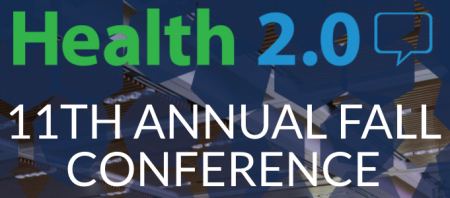
The future of effective and efficient healthcare will be underpinned by artful combinations of both digital technologies and “analog humans,” if the first day of the Health 2.0 Conference is a good predictor. Big thoughts about a decentralized future in healthcare kicked off Day 1 of the 11th annual Health 2.0 Conference in Santa Clara, CA. The co-founders of Health 2.0 (H20), Matthew Holt and Indu Subaiya, explained the five drivers of the tech-enabled health future. 1. The new interoperability, underpinned by FHIR standards and blockchain. “FHIR” stands for fast healthcare interoperability resources, which are informatics standards that enable data
Weaving Accenture’s Five Digital Health Technology Trends for 2017
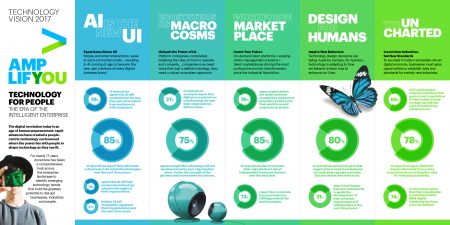
Technology should serve people, and Accenture has identified five major key trends that, together, could forge a person-centered, -friendly, -empowering healthcare system. This is Accenture’s Digital Health Technology Vision for 2017. “Should” and “could” are the important adverbs here, because if tech doesn’t deliver, driving efficiency and effectiveness, personalizing medical treatments, and inspiring people to become more health literate and health-engaging, then tech is just a Field of Dreams being built and available, with no people taking advantage of the potential benefits. The five new-new tech trends are: AI is the new UI, where healthcare experience is everything Ecosystem power
Artificial Intelligence, AI, Is Becoming the New Operating System in Health – Accenture
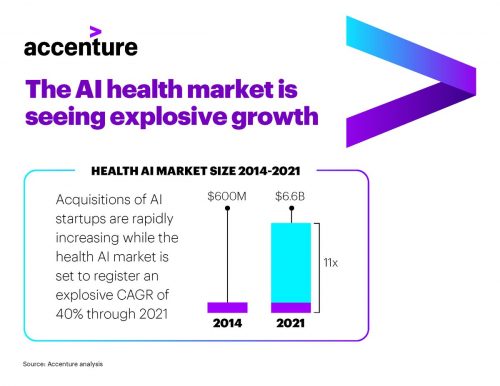
Artificial Intelligence, AI, can help drive the Triple Aim in healthcare, reducing cost, improving quality, and expanding access, according to Artificial Intelligence: Healthcare’s New Nervous System from Accenture. Acquisitions of AI developers in health will be fast-paced, growing at a compound annual growth rate of 40% – “explosive” in the word of Accenture – moving from $600 mm in 2014 to $6.6 billion in 2021. What these AI startups will do is to enable machines to sense, comprehend, act and learn, Accenture foresees, to augment administrative and clinical tasks which could free up healthcare labor (say, doctors, other clinicians, and accountants)
Expecting Alexa and Roomba for Health: Emerging AI and Robotics Trends for Healthcare via PwC
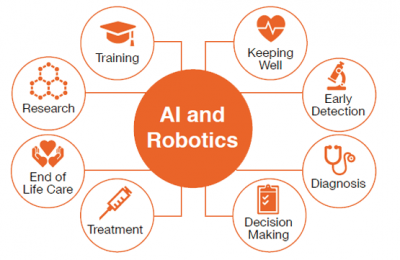
“What doctor?” asks the title of a PwC report on the emergence of artificial intelligence (AI) and robotics in healthcare. AI and robot technology are penetrating all aspects of the macroeconomy, and they’ve begun to re-shape the health economy, as well. Underneath PwC’s titular question are two lenses: the role of the AI/robot doctor vis-a-vis the role of the human doctor. PwC identifies eight areas that AI and robotics will impact in healthcare, shown in the first diagram: Decision making Diagnosis Early detection End of life care Keeping well Research Training, and Treatment. For keeping well, AI and robotics can
Healthcare and the Autonomous Car: Setting the Stage for HIMSS17

The autonomous car is a metaphor for healthcare: that’s how my first interview kicking off the HIMSS marathon began. The annual 2017 HIMSS conference isn’t your father’s or mother’s HIMSS of ten years ago, or even the HIMSS of 2010 — the year that financial incentives for EHR adoption began to stream from the HITECH Act of 2009, motivating thousands of healthcare providers to acquire and meaningfully use digital health records systems. Then, the HIMSS conference floor was abuzz with EHR frenzy. This week, over 43,000 people working at the intersection of healthcare and technology have converged in Orlando, Florida, for
Health/Care Data Ecosystems E-merge at CES 2017
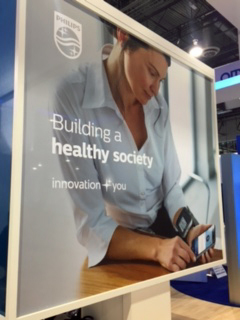
Digital health innovations were fast-proliferating at CES 2017. The bad news is there are so many of them, it’s dizzying and fragmented. The good news is that there are emerging health data ecosystems that will streamline consumers’ user experience so that people can derive knowledge, actionable advice and value out of using these tools. Walking miles of aisles in the Sands Convention Center in the first week of January 2017 can be a dizzying prospect, with hype and best-faces-forward in every single exhibitor at the show. In the health segment at CES, there’s a long list of digital tools to





 Thank you FeedSpot for
Thank you FeedSpot for